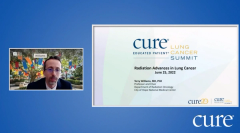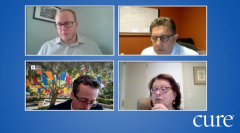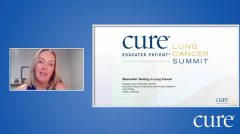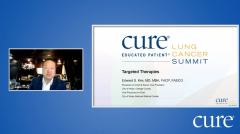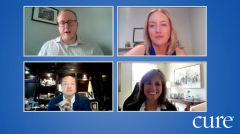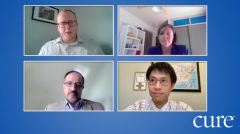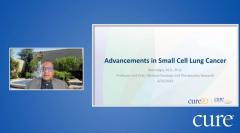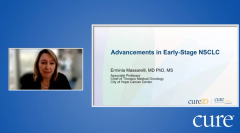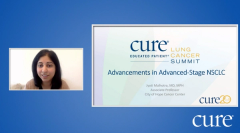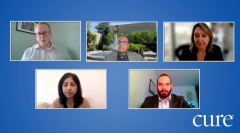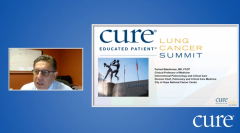
Educated Patient® Lung Cancer Summit Looking Ahead Panel: June 25, 2022
Watch Dr. Ravi Salgia, Dr. Erminia Massarelli, Dr. Jyoti Malhotra and Daniel Saez answer questions about advancements in lung cancer during the CURE Educated Patient Lung Cancer Summit.
Episodes in this series

This panel was moderated by Ryan McDonald and featured Dr. Ravi Salgia, Dr. Erminia Massarelli, Dr. Jyoti Malhotra and Daniel Saez.
McDonald: To start, I'd like to ask Dr. Malhotra, can you comment on the different assays used for PD-L1 and why different results might occur?
Malhotra: Yeah, sure. That is actually a very good question. And there are two aspects to that answer. One is that there are a number of different assays that have been developed for PD-L1 expression, testing or measurement. And it has really depended on the company that developed it and which PD-1 or PD-L1 inhibitor. It was developed as a companion diagnostic for and we do see that variation, there is an ongoing process and harmonization international process going on, in which experts in this field are trying to look at these different assays and come with a consensus on how to make sure that assays are adhering to some common guidelines so that there is not so much variability. The other answer is that PD-L1 expression is not something which stays the same. For example, there's data to show that with chemotherapy or with radiation, for example, the PD-L1 expression in the tumor itself can change. So that's why it's not a static number. It's a dynamic number. And hopefully, we'll get more research on it.
McDonald: Thank you. Daniel, I'd like to bring you into the fold as well. And one of the questions that were coming in and I think throughout the summit, and I think you'd be great to answer is the role of clinical trials, we saw all this data presented by all of our presenters. So how important is it to have so many clinical trials to continue moving treatment options to the forefront?
Saez: Absolutely. That's a great question. Thank you, Ryan. Clinical trials are by far the most effective way for patients to move the science forward to also receiving appropriate treatments themselves. Many times, patients need clinical trials to perceive what would be the most appropriate treatment after their second- or third-line, FDA-approved treatment. In addition, like you said, the role of clinical trials is two-fold to not just provide the patients with the treatment now but also to create data so that we can approve new therapies such as Dr. Malhotra was going through, is a new immunotherapy combination, for example, or new targeted therapies for patients.
McDonald: Okay, thank you. Now, Dr. Massarelli, question came in, which I think is important to talk about, because, you know, we know not every patient is the same, not every disease is the same. Some people are curious, and a few can shed some light, why can some patients stay on a particular drug for (a certain) amount of years, but then it doesn't work like that for (others)?
Massarelli: Let's look, for example, at the EGFR-mutated patients. All EGFR, even within the same type of mutation, I say excellent evolution, they're not all the same, because commutation depends also on the tolerability of these patients on the drugs. So one reason why patients may not actually be able to stay on drugs is because it's likely toxicity problems and they have to decrease the dose. And then unfortunately, the practice and work as well as you know, somebody who's actually able to tolerate the full dose, another problem is the commutation. So, we know that not only do you find other, non-cancer cells the same so there are some EGFR-mutant non-small cell lung cancer that, unfortunately, do not respond to EGFR tyrosine kinase. Well, and it's a small, it's about less than 30%. However, for example, here in South California, because we have large numbers of EGFR-mutated patients, we do have in our clinics, many patients who are not even able to stay on EGFR tyrosine kinase inhibitor for a year. So that's why the research and the possibility of clinical trials is fantastic, even in first-line (treatment). And I showed you also in early stage, because in the clinical trials, we obtain the biopsies we do a lot of studies on the tumors, and we can actually discover more mutations, more genetic alteration not only in the genes but also in the mutation or other expression of the genes. So I really encourage patients to go on clinical trials early on, because that's the only way really that we can advance the knowledge on that cancers.
McDonald: Okay, thank you. Dr. Salgia, I'd like to ask you one question. Someone is asking if you've had a recurrence after prior treatments, what's the feasibility of using, say chemo and immuno in later lines of treatment?
Salgia: Exactly what Dr. Malhotra and what Daniel said to is. You have to individualize the therapy. You talked a lot about precision medicine today. But we also have to remember, it's not just precision medicine, it's personalized medicine, right? You have to take into account the patient's age, you have to take into account the performance status, you have to take into account how they tolerated the previous therapy. Personalize it that way include precision medicine is one of your tools. I always say the following is that precision medicine is like your stethoscope, you're going to use it as one of your tools to be able to make a decision to say if somebody recurs. So relapses, what can we do? Can we do further surgery or radiation therapy or chemotherapy or immunotherapy? So it all depends on where that patient is in their journey. And then we decide from a personalized perspective, what is the best therapy, and I can't agree more. And each time if we can incorporate clinical trials, wherever that person is in their journey is going to be important. It's an embarrassment for all of us. I guess I'm the oldest one in this room right now that we've done so many trials and we can accrue to those trials. But yet, you know, our pediatric colleagues have made so many great advances in the context of clinical trials, we need to do the same. We need to recognize within our nation that this is important. And we continue to answer to that question. It depends on the person depends on the personalized approach that we take.
McDonald: Okay, thank you. Dr. Malhotra one person is asking if we can talk about antibody drug conjugates that are available and the trials that are going on in that space?
Malhotra: Yes, that is a very promising area of research. And we did not cover it in our talk because we had limited time, but really up and coming especially after ASCO this year. So antibody drug conjugates, as the name suggests, is a conjugate there is a payload which is the chemotherapy drug or the drug that's actually going to kill the tumor. And then it's joined together with an antibody which is specific for the tumor cells. And it could be anything right it could be hard to for HER2 expressing tumor cells. It could be EGFR for EGFR expressing cells, just as an example. And the goal is that it's very targeted, it goes into the tumor specifically and then releases the payload, which then kills the tumor cells. So the good thing is that it's very specific, but at the same time, it's a new area of research. There are trials ongoing, there are some off target toxicities, meaning that some of those antibodies may also cross react with other body parts, say skin causing a rash or some other organ. So there is a lot of work going on. For example, Dr. Salgia was talking about small cell lung cancer, there was a conjugate for targeting DL3 in which it worked, but it had a lot of toxicity. And therefore, the drug was discontinued, but now we are looking at newer drugs. So yeah, it's a promising area, but we have to be cautious to test them thoroughly in trials before taking them to the next step.
McDonald: Okay, thank you. Now I'd like to go back to Daniel. We've been talking about all these therapeutics and biomarker test results in general. So can you shed some insight for those who still may be unsure? You know, how should patients use the results to guide their treatment decisions?
Saez: Yeah, particularly for non-small cell lung cancer in the metastatic setting, biomarker testing is extremely important, ideally, prior to the first line of treatment, but it's also important, following progression of that first line of treatment, the biomarker testing can unlock sort of the key to what appropriate treatment might be for patients. So the most effective way for patients to use biomarker testing in their treatment decisions is to ask for a copy of it and make sure that they understand what the biomarker testing is telling them. So the results will include what mutations may be present and what FDA-approved therapies may be correlated to those mutations, but also may include some clinical trial options. So one of the best ways again, is to have conversations with your doctor or reach out to patient advocacy organizations like the Go2 foundation or LUNGevity for assistance with that resource.
McDonald: Okay, thank you. Dr. Salgia, a couple questions came in on this and I know we briefly talked about it throughout the summits, and especially in the session, but the neoadjuvant space, can you touch upon that a little further and talk about the results we have in that space and where we still need to go?
Salgia: Absolutely Dr. Massarelli really talked about that. But what that means is can you get a certain number of therapies before your surgical resection for early-stage disease. That's what it means. So we've done a lot of these trials when I was in Boston, in Chicago and now here in the neoadjuvant setting where we used to think, well could we give chemotherapy like carboplatin and paclitaxel, before surgery, but that didn't really work. Then the combined effort was can we give carboplatin, paclitaxel, with (Avastin [bevacizumab]), before surgery as neoadjuvant that really didn't work and there was not enough accrual for patients on to their clinical trial.
Then there were some innovative ideas such as our AR alpha, and giving it pre surgery and then innovation of our AR alpha as an example. I just use that as one example. And then doing surgery. But then we really didn't impact on the tumor size being reduced, or a pathologic CAR, as Dr. Massarelli talked about, or overall survival, disease-free survival, until these new concepts came out. And clearly we acknowledge many of our colleagues when they looked at immunotherapy given us a new adjuvant, as you heard, and you know, up to 40% of pathologic CR unheard of precedents in our world, which is fantastic. In the new Endura trial that Dr. Massarelli also talked about is that, you know, you're seeing such great responses, and then do a surgical resection. I think ultimately, as the name suggests, for today, we want to go for a cure. So it's not just about the DFS. It's not about the disease-free survival. It's not about the pathologic CR. But can we through these new adjuvant approach, cure our patients, our colleague, Dr. Jack West, it talks a lot about this, right? If you go on social media, and Jack talks about this, or even in the context of the various publications, that, you know, we're happy that we're seeing these great responses in the new adjuvant setting. And we want to make sure we have those, and we get this huge changes in hazard ratios. And we also want to make sure that our patients and families get what is really appropriate for them. Is there an overall survival benefit? And that's where new adjuvant has to come in.
Massarelli: I want to talk to Dr. Salgia when he said that the key is to find those patients who are basically really cured by new adjuvant approaches. Now, because immunotherapy is also toxic. I mean, as we saw from that from a larger stock, we have we can have side effects that actually can affect the life of this patient. So I think the key at this point is to really personalize as we say, you know, the treatment and so the idea is that on colleges, you know, with the team because it's a care team, you know, be the oncology surgical oncologist, radiation oncologist, we have wonderful tumor boards in our co-op and major academic centers, you know, have tumor boards as well and other centers as well. So we integrate also with our colleagues in network science abroad that basically decide what's the best treatment for the single person.
Transcription edited for clarity.
For more news on cancer updates, research and education, don’t forget to

